Phil 347 quiz Study guides, Revision notes & Summaries
Looking for the best study guides, study notes and summaries about Phil 347 quiz? On this page you'll find 160 study documents about Phil 347 quiz.
All 160 results
Sort by
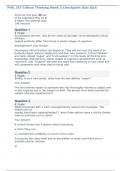 Popular
Popular
-
PHIL 347 Critical Thinking Week 3 Checkpoint Quiz Q&A
- Exam (elaborations) • 6 pages • 2023
-
- £8.08
- 1x sold
- + learn more
PHIL 347 Critical Thinking Week 3 Checkpoint Quiz Q&A Score for this quiz: 48 out of 50 Submitted May 24 at 6:04pm This attempt took 149 minutes. According to the text, how do the views of stronger, more developed critical thinkers toward authority differ from those in earlier stages of cognitive development? Your Answer: Developed critical thinkers are skeptical. They will not trust the word of an authority figure without skepticism and their own research. Critical Thinkers are likely r...
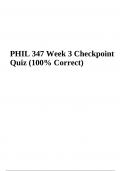 Popular
Popular
-
PHIL 347 Week 3 Checkpoint Quiz (100% Correct)
- Exam (elaborations) • 5 pages • 2023 Popular
- Available in package deal
-
- £12.53
- 1x sold
- + learn more
PHIL 347 Week 3 Checkpoint Quiz (100% Correct). According to the text, how do the views of stronger, more developed critical thinkers toward authority differ from those in earlier stages of cognitive development? (pg. 116 - 117) Our text explains that folks in the earlier stages of cognitive development view authority as someone who is powerful and capable of controlling others' behavior, or as someone trustworthy, who can offer good advice (Facione & Gittens, 2016). For example, parents an...
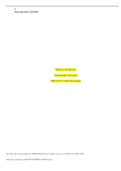
-
PHIL 347 Critical Reasoning (Entire Course Week 1 – 8) BUNDLE | 100% Guaranteed
- Package deal • 18 items • 2022
-
- £15.76
- 2x sold
- + learn more
PHIL 347 Week 1 Assignment: Journal PHIL-347 Week 1 Course Project: Topic Selection PHIL 347 Week 1 Discussion: Wisdom vs. Knowledge (With Replies) PHIL 347 Week 2 Assignment: Journal PHIL-347 Week 2 Checkpoint Quiz (100% Correct) PHIL 347 Week 2 Discussion: Context, Meaning, and Value – Option 1: California Washington Mural (With Replies) PHIL-34
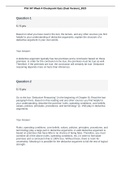
-
Phil 347 Week 4 Checkpoint Quiz (Dual Version)_2023
- Exam (elaborations) • 10 pages • 2023
-
- £7.05
- 1x sold
- + learn more
Question 1 5 / 5 pts Based on what you have read in the text, the lecture, and any other sources you find helpful to your understanding of deductive arguments, explain the structure of a deductive argument in your own words. Your Answer: A deductive argument typically has two premises and a conclusion based on those premises. In order for the conclusion to be true, the premises must be true as well. Therefore, if the premises are true, the conclusion will certainly be true. Deductive re...
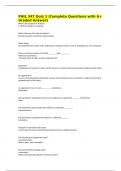
-
PHIL 347 Quiz 1 |Complete Questions with A+ Graded Answers
- Exam (elaborations) • 3 pages • 2024
-
- £8.40
- + learn more
PHIL 347 Quiz 1 |Complete Questions with A+ Graded Answers What is the purpose of analysis? To find the speaker's meaning. What is the very first step of analysis? Find the speaker's conclusion and premises. Claim means The statement the maker of the argument is seeking to show is true or probably true, the conclusion. Claim can also be used to refer both ________ and ________. Premises; Conclusions. *The text refers to claim as the conclusion only* Argument Combinat...
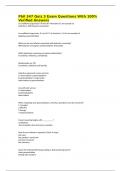
-
Phil 347 Quiz 3 Exam Questions With 100% Verified Answers
- Exam (elaborations) • 2 pages • 2024
-
- £8.40
- + learn more
Phil 347 Quiz 3 Exam Questions With 100% Verified Answers In conditional arguments if A then B A Therefore B is an example of: Valid form: Affirming the antecedent In conditional arguments, if A are B C is A therefore, C is B is an example of: Applying a generalization What are the two fallacies associated with deductive reasoning? Affirming the consequent and Denying the antecedent Which deductive reasonings are about relationships? Transitivity, reflexivity, and identity ...
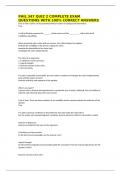
-
PHIL 347 QUIZ 2 COMPLETE EXAM QUESTIONS WITH 100% CORRECT ANSWERS
- Exam (elaborations) • 2 pages • 2024
-
- £8.40
- + learn more
PHIL 347 QUIZ 2 COMPLETE EXAM QUESTIONS WITH 100% CORRECT ANSWERS True or false: Claims can be presented without reasons or background information. True. A critical thinking assesses the _______ of the source and the __________ of the claim itself. Credibility, plausibility. When presented with a claim with no reasons, the critical thinker has options: Evaluate the credibility of the person making the claim, examine the plausibility of the claim itself, investigate the claim inde...
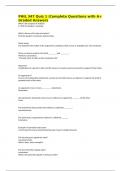
-
PHIL 347 Quiz 1 |Complete Questions with A+ Graded Answers
- Exam (elaborations) • 3 pages • 2024
-
- £8.40
- + learn more
PHIL 347 Quiz 1 |Complete Questions with A+ Graded Answers What is the purpose of analysis? To find the speaker's meaning. What is the very first step of analysis? Find the speaker's conclusion and premises. Claim means The statement the maker of the argument is seeking to show is true or probably true, the conclusion. Claim can also be used to refer both ________ and ________. Premises; Conclusions. *The text refers to claim as the conclusion only* Argument Combinat...
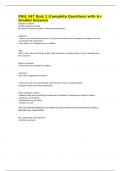
-
PHIL 347 Quiz 1 |Complete Questions with A+ Graded Answers
- Exam (elaborations) • 1 pages • 2024
-
- £7.35
- + learn more
PHIL 347 Quiz 1 |Complete Questions with A+ Graded Answers purpose of analysis find the speakers meaning first step is to find the speaker's conclusion and premises argument *-two or more declarative statements, at least one of which serves as evidence to support the truth or probable truth of the other. -not a quarrel, or a disagreement or a debate. claim refers to the statement that the maker of the argument is seeking to show is true or probably true, the conclusion Reas...
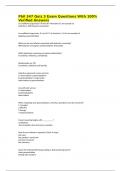
-
Phil 347 Quiz 3 Exam Questions With 100% Verified Answers
- Exam (elaborations) • 2 pages • 2024
-
- £8.40
- + learn more
Phil 347 Quiz 3 Exam Questions With 100% Verified Answers In conditional arguments if A then B A Therefore B is an example of: Valid form: Affirming the antecedent In conditional arguments, if A are B C is A therefore, C is B is an example of: Applying a generalization What are the two fallacies associated with deductive reasoning? Affirming the consequent and Denying the antecedent Which deductive reasonings are about relationships? Transitivity, reflexivity, and identity ...
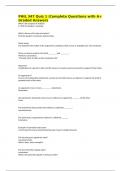
-
PHIL 347 Quiz 1 |Complete Questions with A+ Graded Answers
- Exam (elaborations) • 3 pages • 2024
-
- £8.40
- + learn more
PHIL 347 Quiz 1 |Complete Questions with A+ Graded Answers What is the purpose of analysis? To find the speaker's meaning. What is the very first step of analysis? Find the speaker's conclusion and premises. Claim means The statement the maker of the argument is seeking to show is true or probably true, the conclusion. Claim can also be used to refer both ________ and ________. Premises; Conclusions. *The text refers to claim as the conclusion only* Argument Combinat...

How much did you already spend on Stuvia? Imagine there are plenty more of you out there paying for study notes, but this time YOU are the seller. Ka-ching! Discover all about earning on Stuvia


